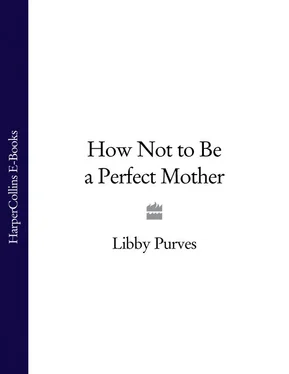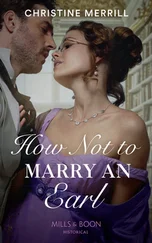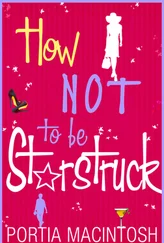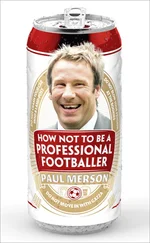Confronted by this tyrant, you drop everything and swim with the tide, serving the baby and forgetting that you ever had preferences of your own. At first, this makes good sense; for a few months after a birth, nobody should expect much beyond survival and the odd quiet drink in front of the television. The problem is that the habit of self-obliteration tends to carry on for too long, reinforced by the sentimental picture we have of motherhood. Sometimes, the reasonable doctrine of ‘demand feeding’ continues unreasonably for 18 years, and widens to embrace demand washing-up of teenage midnight feasts and demand lending of the family car every Saturday night. Even in the early days, we overdo the sacrifice: we leave the house on freezing days with the children wrapped like Eskimos, but too preoccupied to put on our own coats. We stop every conversation five times a minute to wipe noses and respond to insistent little voices at knee-level; we walk miles in blizzards to buy finger-paints (well, I did, once). After a few years of this, we end up dressed like bag ladies and apologizing to everybody. For the most extremely unselfish mothers, the ones with no pleasures of their own, are often the ones who feel most guilty and depressed.
There is enormous pleasure in being a parent. It is fun to watch a baby grow, and smile and talk and begin to invent mad private games with bits of old hosepipe and buckets of sand; but it is also cripplingly hard graft. It is inescapable work: even professional nannies and nurses, when their own first babies are born, have been reduced to tears by the realization that now there will be no days off. A mother’s working day can stretch to 18 hours or more if she lets it.
But why should we let it? If there are corners to cut, which hurt nobody, why not cut them? Why not bend the baby to your own convenience every now and then? May not a saint put her feet up with a beer and a book occasionally?
This book is about the way real, fallible mothers really get through the day. There are plenty of technical baby manuals on the market: some are excellent, some manage to make bathing a baby sound as complicated as stripping down a MIG fighter engine; nearly all of them are perfectionist in tone. This is an imperfectionist book, about the cheerful cutting of corners, without guilt.
Of course you have to look after babies and small children properly. It is hard not to, when every whimper of fright or trembling lip can strike you with agonized sympathy. But with a bit of low cunning, you can win a part of your own life back, and do the child no harm. Squaddies in the army have always understood this principle: the war has to be fought, and possibly your life sacrificed, but in the process you can work the system, sneak the extra chocolate into your knapsack, and get a kip behind the cookhouse while someone else peels your load of potatoes. You stop short of treason or desertion, but there are always rules to bend.
From madonna-and-child to Sergeant Bilko is a bit of a comedown for your image, perhaps; but it is much easier to live up to, and considerably more fun. Sometimes, as Bilko, you actually do the same things that the perfectionists would have you do, but for slightly different reasons. During the worst difficulties of early breastfeeding, when no theoretical benefit to the baby compensates for the pain, I kept myself going on the thought that the more breast milk I got down the baby, the less chance there was of having to nurse him through frightening baby illnesses. Or take discipline: I once watched two mothers at tea, both pestered by their toddlers. One kept saying: ‘Don’t touch the mug, darling, it’s hot, it might burn you.’ The other mother put it differently: ‘Don’t touch that mug, darling. It’s Mummy’s.’ I noticed that the latter one managed to drink her tea, fending the little beast off with her arm and defending her rights; whereas the former put her mug up on a nice safe shelf and never touched a drop. She left, tired and thirsty, for another gruelling bathtime of creative water-play and coaxing. I suspect that the more selfish and least ‘perfect’ mother (who, no doubt, used bathtime as a chance to paint her own toenails while the child splashed undisturbed) was the happier woman. And as for the children, I doubt whether it made much difference to them either way.
This book covers the first three years, or a little more, depending on your child. I have never seen the point of lumping ‘preschool children’ all together; it is the first three years which contain the maximum bewilderment and the fastest changes. A baby has landed, as alien as a UFO, as odd as a dream. Slowly he turns into something more like a human adult, and as the fourth year begins, he has travelled a long way towards it. You have, at three and a half, a small individual who can talk enough to be reasoned with, who knows (although he may not agree) that fair is fair and orders is orders. You are not forever having to coax him to lie on his back while you change nappies; he can communicate with strangers and eat with a knife and fork.
At this age, too, children become widely different individuals. Not that they aren’t individuals before three; but early on, the common qualities far outweigh the differences. All six-month-old babies grab the spoon when you try to feed them; all new walkers pull things off tables on to their heads; and the particular qualities of a two-year-old (not unlike a suitcaseful of gelignite on a bouncy castle) are pretty universal too. But after four years you may have acquired a tough gunslinger or a dainty Victorian miss (of either sex); an intellectual or an athlete or a socialite. They stand apart from one another, small but separate, each on a private platform of heredity and chance and conditioning. So a mature three seemed a good age at which to stop; it is also the period which I know best from my own life. To fill in the gaps and catch the great and ingenious variety of mothering styles, I consulted 50 friends, with 86 children between them. Some are of my generation, some older or younger; some working mothers, some housewives, some single parents. To all of them I am boundlessly grateful for their advice, confessions, encouragement and occasional reproofs.
One final apology. These days, writers have to tie themselves in knots trying to be fair to both sexes (back in the days of Truby King a baby was ‘he’, and that was that). Some writers say ‘he/she’ and ‘his/hers’ all the time, or else alternate ‘he’ and ‘she’ so that you get a disquieting impression of a running sex-change; some bravely confess that since theirs are all boys or all girls, they will stick to the sex they know best. Nobody dares to say ‘it’ any more, even of a foetus, lest the mothers should be mortally offended.
I have one of each sex, myself. And after much thought, I have decided to use he, she and it indiscriminately and according to my mood. I hope it does not annoy you too much. After all, nobody’s perfect.
Chapter One
Pregnant, Proud and Panic-stricken
When I was first pregnant, and prone to describe every last flutter and twinge to everyone I met, I went to lunch with a friend who already had a couple of children under two. I sat in my circular splendour, hands folded on my vast bump, while she mopped and wiped, and caught toppling high-chairs, and embarked on wild, hopeless lines of reasoning about Teddy eating up his carrots and the discarded rabbit-slipper not wanting to sit in the milk-pan really . For the first time, at that moment, it occurred to me that pregnancy is a lousy sort of preparation for motherhood.
When you are pregnant, you buy new clothes, think about your diet, avoid lifting, put your feet up, and dwell endlessly on every gripe and swelling of your precious body. You attend classes about your internal organs, watch your fingers anxiously for signs of oedema, and are told to feel proud of yourself. Once the baby arrives, what happens? You never get your feet up, you live off discarded Marmite soldiers, wear old shirts covered with sicked-up banana, and have to lift a great lump of a baby around all day.
Читать дальше












